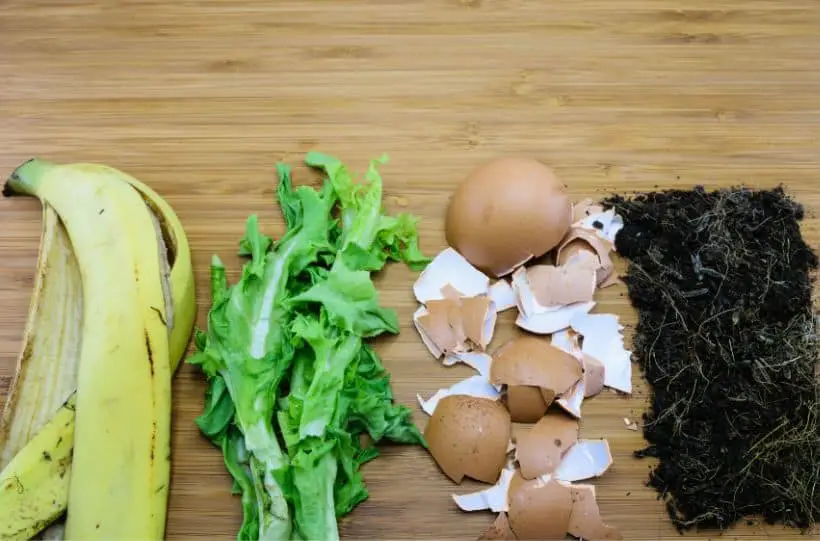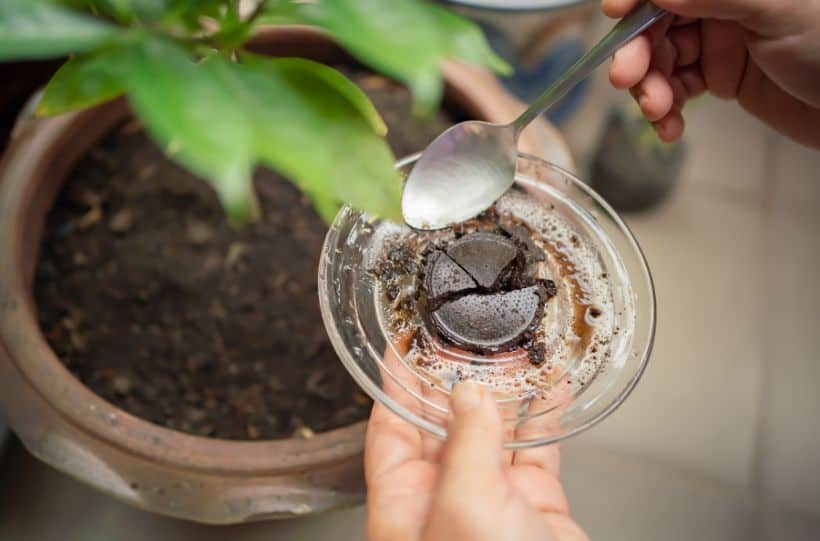Frugal DIY Fertilizers for Your Garden
Fertilizer is a necessary part of any garden, but it doesn’t always have to be expensive. With the right planning, you can make the most of your garden by using frugal and often homemade fertilizers that can easily improve your soil without breaking the bank.
The option best for your garden can be found by using a soil test kit to tell if your soil’s PH level is too high or too low because this is determined by the nutrients in the soil.

This post contains affiliate links that earn me a commission at no additional cost to you.
Frugal Fertilizers For Your Garden
Compost
Compost is a great fertilizer for your garden because it’s full of nutrients in the form of decomposing plant material. You can make compost out of just about anything, from vegetable scraps to old coffee grounds and eggshells.
A simple compost pile will be the very cheapest option but a compost tumbler is another great option to make your own compost on a budget.
Composting takes some time, usually a few months, but the end result will be worth all that waiting and the small amount of work involved. The best way to use this fertilizer is by spreading it over an area that has been planted or tilled right into the soil before planting.
This type of fertilization will need to be done once every year or two, depending on how often you water your plants and how needy your particular plants are.
Compost tea
Compost tea is a great option for fertilizing your garden because it’s relatively fast, easy to make, and can be used all year long. In addition to providing nitrogen necessary for plant growth, this fertilizer also provides trace minerals that would otherwise take a long time to for with traditional composting methods.
You can make a quick and easy compost tea for your garden even if you do not have space or time to deal with making regular compost.
Epsom salts
Another great option for a frugal fertilizer is Epsom salts. This is particularly true if you wish to fertilize just specific plants or if you have limited space in your yard since Epsom salt sprays can be applied to the individual base of plants well as the soil around them.
Adding Epsom salts to tomatoes is one of the more popular methods for helping your tomatoes and peppers produce more fruit. Epsom salt is great for helping deal with blossom end rot.
Banana peels
It is also possible to make a frugal fertilizer using banana peels. They’re an effective source of potassium and can be left in the garden before they even start to decompose without burning your plants.
They will break down and feed the soil potassium. If you have a leaf miner issue, you can place banana peels at the base of the plants to give them a better chance at survival by strengthening your plants. To speed up decomposition, you can cut your banana peels into small pieces.
Used Coffee Grounds
Used coffee grounds are a great choice for fertilizing your garden because they can be applied in large quantities without worrying about over-fertilizing, and the smell of coffee is fantastic at repelling pests.

If you do not drink much coffee, try asking friends and family to save you coffee grounds or stop by your favorite coffee shop that more often than not will be willing to share their used coffee grounds with your garden.
Ash from a wood fire
Wood ash makes an excellent fertilizer for your garden. Wood ash is great for adding calcium to your garden. If you are looking for a great way to lower the PH of your oil, you can use wood ash.
This can be tilled into your soil if you tested it before planting or mixed with water to make a form of compost tea that can’t be poured over a garden bed with too acidic soil.
Eggshells
Eggshells are a great fertilizer for your garden because they provide additional calcium to the soil. You should crush them up first before adding them as an amendment so that any leftover nutrients don’t get washed away by rain or watering.
Smaller crushed eggshells will work their way into the soil to break down, while larger eggshell bits will sit on top of the soil and help deal with pests like snails and slugs but will take months to fully break down and add calcium to the soil.
Fish emulsion
If you have a fish tank, the water leftover when you clean out the take can be used in your garden. The waste from your fish provides the nutrition your plant needs.
Some hydroponic gardening systems even run on fish to provide the nutrition the plants need. You can purchase fish emulsion from the local garden store if you do not have a fish tank. This is a great organic fertilizer, and it will release nutrients quickly.
In periods of active growth, such as when planting vegetables or flowers, the fish emulsion can be used to boost nutrition in the soil without having to wait for any breakdown to take place.
Rabbit waste
If you have a rabbit or know someone with a rabbit, you can get one of the best fertilizers available. Rabbit poop is the only manure fertilizer that 100% doesn’t need to be composted before it can be added into the garden.
This fertilizer is so popular you can even buy it on local buy-sell-trade groups if you want to try this fertilizer in your garden but do not have access to a rabbit to get it for free.
Cover crops
Growing a cover crop otherwise known as “green manures” is an amazing way to improve your garden soil for the following growing season.
Growing a cover crop allows you to get a large harvest of a nitrogen-fixing plant this year. Then after harvesting what you want from the plant, you till the remainders of your cover crop plants into your soil to add organic matter that will aid in drainage and add nutrition to the soil as it breaks down.
Great edible cover crops include green beans, peas, radishes, and mustard greens. If you want to make the most of your garden beds while you work on improving the condition of the soil this is a great option.
For more gardening tips, check out these posts:
